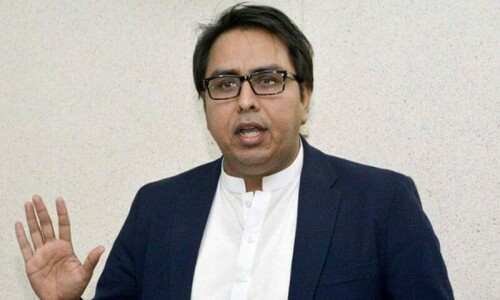KASUR: A water treatment plant located at Deepalpur Road has been made functional after a lapse of about eight years.
This was claimed by Kasur Tanneries Waste Management Authority (KTWMA) here on Monday.
Contaminated water has been discharged untreated into the Sutlej for the last eight years, destroying aquatic life, livestock as well as underground reservoirs of fresh water.
Despite being fully functional, thousands of cubic meters untreated water is still being discharged into the Sutlej as the discharges are beyond the capacity of the plant.
According to KTWMA Project Manager Muhammad Jahanzaib, the treatment plant had turned inoperative in 2009 and “ now it has been made fully functional in February 2017 as per its design capacity.” He said all the pumping stations had been made functional as aeration motors were replaced at a cost of about Rs5 million.
It is interesting to note that hundreds of employees ‘continue to work at the non-functional plant’ and have been drawing salaries worth Rs1.8m per month. Expenditures worth millions of rupees were also drawn from KTWMA, an autonomous body, under the heads of electricity bills and petrol for the generator.
Unit needs expansion as discharges are beyond its treatment capacity
About two years back, the authority had expelled a project manager for allegedly embezzling millions of rupees following the orders of then DCO Javid Iqbal Bukhari.
A tannery owner requesting anonymity said KTWMA had been receiving bills from businessmen for the discharge of contaminated water and draining out untreated water into the Sutlej since 2009. He said dozens of tanneries were sealed and owners booked for default.
According to a press release of the district government, 11 defaulter tanneries were sealed under phase-I, 22 under phase-II while 35 would face closure under the phase-III.
According to Jahanzaib, KTWMA has recovered Rs4m from tannery owners and defaulters owe Rs15m to the authority.
The project manager told Dawn that the plant received 18,000 cubic meter contaminated water per day against its capacity to treat 12,600 cubic meter. “The contaminated water also includes 2,500 cubic meter sewerage water and ice factory discharges as the tannery area is intermixed with the residential one.”
He said there were 237 tanneries in 2001 and the number increased to 272 registered tanneries whereas the capacity of the plant had not been increased.
A KTWMA employee requesting anonymity said the public health department had been asked to manage a separate channel and drains for domestic sewerage but to no avail.
He said on the directions of Shahbaz Sharif, four consultancy firms were in contact with KTWMA while Punjab Environment Minister Zakia Shah Nawaz had ordered to make the plant functional in July 2016. The minister also ordered extension of the plant under phase-II.
Statistics show that about 5,400 cubic meter contaminated water is being discharged into the Sutlej untreated through Bahadarpura drain as the releases are beyond the capacity of the plant.
A fats and protein extraction unit having the capacity of 40 tons per day installed by United Nations Industrial Development Organisation at the water treatment plant in 2012, is still inoperative owing to scarcity of funds and alleged lack of interest on the part of the authorities.
Jahanzaib said UNIDO launched the plant but did not provide accessories, including milching machines, boiler etc., to make it functional. “Although KTWMA is an autonomous body, it is unable to purchase the accessories and requires Rs20m for the purpose.”
Fats from the parts of dead and slaughtered animals are being extracted in the Niaznagar area, causing health hazards.
In the past, local environment authorities booked many people and fined them for running extraction units.
Assistant Director Muhammad Faheem was not available for comments.
Deputy Commissioner Amara Khan, who is also KTWMA chairman, said: “Efforts are under way for extension of the plant.” She said KTWMA could not run without financial cooperation of the Punjab government. “We also need to replace non-technical staffers with the technical ones, including shift engineers, plant in-charge and operators.”
Published in Dawn, February 21st, 2017














































Dear visitor, the comments section is undergoing an overhaul and will return soon.